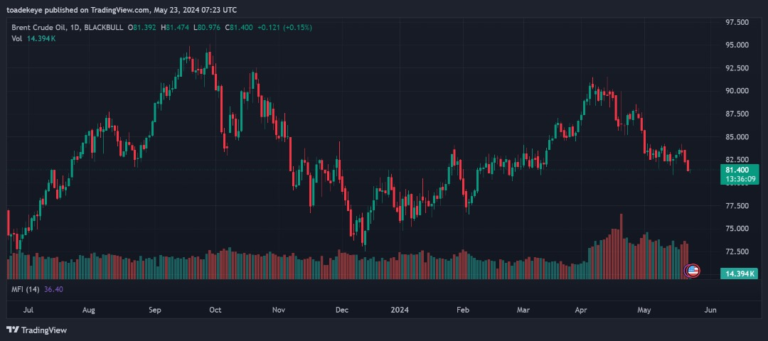Taiwo Adekeye, FMVA
Research Analyst
Oil prices dropped over 1% on Wednesday, marking a third consecutive day of decline, as Federal Reserve officials reignited concerns about oil demand by suggesting that interest rate cuts could be delayed due to ongoing inflationary pressures. The decline was supported by crude stocks increase of 1.8 million barrels during the week ended May 17. Brent crude futures was down by 1.18% closing at $81.90 a barrel while U.S. West Texas Intermediate crude (WTI) was also down by 1.39%,closing at $77.57
Uk: Consumer price index surges by 2.3% YoY
The consumer price index (CPI) surged by 2.3% in the 12 months to April, down sharply from March’s 3.2% increase and its lowest since July 2021. The slowdown in inflation was less than expected, dampening investors and analysts expectation of a lower reading. Services inflation slowed to 5.9% from 6.0% recorded in March. Core inflation, which includes goods but not energy, food and tobacco, also reflected persistent price pressures, with the annual rate falling marginally to 3.9% from 4.2% in March. However, britain exhibits a lower inflation rate compared to the United States, Canada, France, and Germany. Japan has not yet reported April inflation data, while Italy’s inflation rate stands at 0.9%.
China: Fiscal revenue declined by 2.7% in January-April
China experienced a 2.7% decline in fiscal revenue during the first four months of 2024 compared to the previous year, After a 2.3% decrease in the January-March period, signaling ongoing challenges in the economic recovery. Fiscal expenditure surged to 3.5% in the first four months, against a 2.9% gain in the first quarter. For April alone, fiscal revenue declined by 3.7% against a 2.4% decline recorded in March, while fiscal spending was up 6.1%, compared with March’s reading of 2.9%. However, last week Friday, China introduced measures to ease property regulations, while the finance ministry initiated the issuance of 1 trillion yuan in long-term special treasury bonds to stimulate crucial sectors of the economy.
Canada: Inflation hits 3 years low of 2.7%
Canada’s yearly inflation rate decelerated to 2.7% in April, marking a three-year low, while core indicators continued to decline. This trend suggests a heightened likelihood of an interest rate cut in June. In April, there was a 0.5% increase in the consumer price index compared to the previous month. However, from March 2022 until last July, the Bank of Canada raised interest rates by 475 basis points. Since then, it has maintained them at nearly 5%, which is close to a 23-year high. Additionally, the Canadian dollar weakened after the inflation data by 0.29% to 1.3663 against the U.S.D while yields on the government’s two-year bonds were down 7.3 basis points to 4.269%.
South Africa: Inflation eased marginally to 5.2%
Headline consumer inflation in the most industrialized economy dropped to 5.2% year on year in April from 5.3% recorded in the month of March, shattering the expectation of analysts prediction of a stagnant figure. The decline was bolstered by a decrease in annual inflation for food and non-alcoholic beverages, offsetting fuel price increases. The South African Reserve Bank (SARB) has endeavored to guide inflation towards the midpoint of its target range, which spans between 3% and 6%, by maintaining its main interest rate at its highest level since 2009.








